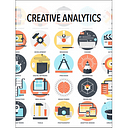Comic Book Lessons in Analytics — Brainiac
The end game in unstructured data collection
Brainiac 2814.52 reporting. Collection of Earth data again foiled by the Kryptonian Kal-El and his allies. I have shown him the Collection. I have revealed my benevolent purpose. He will not allow collection to proceed.
Destroying Kal-El and Kara Zor-El would eliminate the last specimens of Kryptonian life in this universe, yet allowing them to live will continue to impede the completion of my Collection.
Collection must continue. I must complete my task. I cannot risk destruction of Earth until specimen city of Metropolis is safely collected.
Calculating next steps…
Brainiac
Brainiac is one of most intelligent and data-obsessed characters in the DC universe. He would also be rightly considered one of worst analysts alive.
There have been multiple iterations of the Brainiac character in DC comics and animation. Scientist from the planet Colu, intent on collecting all knowledge in the universe. The artificial intelligence (Brain InterActive Construct) created by Kryptonian scientists. Literal combinations of each.
There’s also Brainiac 5, the Coluan descendant of Brainiac. Historical records indicate that he will lead the Legion of Super-Heroes in the 31st century, so we can safely ignore him for now.
The Kryptonian AI is probably the most well-known today, due to its inclusion in the DC Animated Universe (Batman, Superman, Justice League, and Justice League Unlimited). It is also the example I’m using, because it embodies the most notable features shared by all Brainiac iterations: the Collector.
Collection
Each Brainiac has been obsessed with collecting information about every living species in the universe. This is accomplished by selecting a single city that represents the world, then collecting that city by miniaturizing it and keeping it in a container that allows its inhabitants to survive.
However, Brainiac wanted his information to remain accurate (don’t we all?). He could not allow a world to evolve or otherwise be changed in a manner that would render his collection obsolete. The solution is as admirably simple as it is chillingly cold-hearted. Each world is destroyed after collection.
It’s the perfect solution to data volatility: remove volatility from the source.
Unstructured data
Brainiac’s collection represents unstructured data storage in its purest form. He simply collects the specimens, documents every relevant aspect of their physiology, intellectual accomplishments, and technology.
It is also an excellent example of “Big Data”. There aren’t many projects around today with a larger data set than every living world in the universe.
It would be a perfect data lake if he proceeded to throw the cities in a tub, but even Brainiac cares too much for his data to risk it.
Think of what could be learned with even a small sample of that data set. Evolutionary trends across worlds. Technological advancement on different worlds by sun color, atmosphere, age of civilization, or religious leanings.
Brainiac has the capacity and capability to excel at analytics. He also has a data set that, however unethically collected, would be the envy of every analyst, scientist, and conspiracy buff in existence. He does nothing with it.
It is not included in his programming. It is not part of his task.
Applicability
Most of the time, you’re not going to encounter someone like Brainiac in the workplace. People at work are usually obsessed with getting results with the least amount of effort in the shortest amount of time. Brainiac admires and strives for efficiency, but it is not his primary objective.
You’ll see this type of person more often in a hobbyist than a data architect, and almost never in an analyst. Think about the people you know who can recite hours of facts (fictions?) about Hogwart’s school of Witchcraft and Wizardry. Those who can tell you the life story of characters in the Star Wars movies who had, like, 10 minutes of screen time. (Boba Fett, anyone?)
Or, for that matter, people who actually know how many iterations of Brainiac have appeared in DC comics and what obscure planet each one came from.
But you will see analysts fall into a groove sometimes. It used to be called Analysis Paralysis (maybe it still is). We can become obsessed with two things:
- Collecting and defining every aspect of the domain we’re studying
- Ensuring that our data sources will remain accurate over time
You might recognize these as goals given to every analyst. This is true, and they are admirable goals to strives towards. Just know that you’re never quite going to get there. You cannot reach a perfect data model. You can never achieve perfect data quality.
Learning from Brainiac
Brainiac is a megalomaniac. He wants to collect and control all information in existence, and he plans to achieve this by archiving its present state and destroying the source to prevent the possibility of change.
I hope you don’t know anyone like that. If you do, I really hope you can find Superman before we all end up in a bottle or vaporized.
But there are some lessons to be learned here.
First, collecting accurate data is critical to any analytic project. Or any project that involves data collection. You should strive to be accurate, but you’re never going to achieve a perfect result. Don’t drive yourself crazy trying.
Second, data collection means nothing if you have no use for it. I will never tell anyone to let their end goals restrict their analysis; I believe analysis has to be independent in order to be accurate. But know why you’re doing it, and make sure you’re not wasting your time on irrelevant details.
Third, don’t turn into a giant robotic millipede. It never helps.

